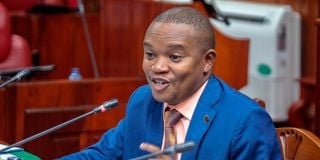Premium
Cartels won't hijack President Ruto's affordable houses, MPs assure Kenyans

National Assembly Finance Committee chairperson Kuria Kimani during a session at County Hall Nairobi on November 23, 2023.
Members of Parliament have assured the public that cartels will not hijack President William Ruto's housing project and allocate houses to themselves at the expense of other Kenyans.
Speaking in Homa Bay County during the ongoing public participation on the Affordable Housing Bill, 2023, Finance and National Planning Chairman Kuria Kimani said the committee will come up with proposals to ensure that only one unit is allocated to an individual.
According to Mr Kuria, the committee will propose to Parliament that the Kenya Revenue Authority (KRA) Personal Identification Number (PIN) be used to allocate the houses.
The move, according to the chairman, would ensure that the allocation is done on a 'one unit per one Kenya Revenue Authority Personal Identification Number' (KRA PIN) policy.
"Fears that this programme may not benefit its intended beneficiaries have been raised in the public hearings we have held so far. I want to assure you that the committee will come up with a mechanism to ensure that the programme is not hijacked by cartels. We will recommend only one housing unit per KRA PIN," Mr Kimani said.
"Concerns have been raised in all the counties where we have held hearings that these houses may end up largely benefiting other people and not the common man. However, I want to reiterate that the committee will propose measures to ensure that this programme also benefits those at the very bottom, that's why it's called affordable housing," he added.
Participants urged MPs to amend the Bill to provide for the houses to be built in rural areas, pointing out that the project currently appears to be concentrated in urban areas, excluding those living in rural areas.

President William Ruto speaks to a construction worker in Ol Kalau, Nyandarua County during the launch of the affordable housing project on January 11, 2024.
Legal representatives told the committee that there was a need to harmonise the Bill with the provisions of the Housing Act to ensure that the two did not overlap.
"There is a need to harmonise this Bill with the current Housing Act so that the two laws do not end up contradicting each other. If there is a need to amend the Housing Act, let us do so instead of creating a provision in the Affordable Housing Bill and then end up with conflicting laws," said Mr Joshua Nyamori.
The committee was also asked to define how the functions of the Affordable Housing Board in the Bill are different from those currently performed by the National Housing Corporation.
They also urged MPs to ensure that the Bill is amended to include at least one professional working in the construction industry, such as civil engineers, and a representative of persons with disabilities on the Affordable Housing Board.
Acting Vice Chancellor of Tom Mboya University, Elyjoy Micheni, wants the government through the Bill, to partner with universities to build hostels for students.
"It is my proposal that this Bill considers the incorporation of student hostels to address the current shortfall. The majority of our students live in the slums because we do not have enough hostels and they cannot afford to rent houses in the town," Prof Micheni told the committee.
Kisii University Vice-Chancellor, Prof Nathan Oyori Ogechi also supported the sentiments saying the move would help in meeting the shortfall of student accommodation.
Kisii County Pastors and Clergy Forum represented by Rev. Hezekiah Onchike proposed that the government should consider reducing the contribution to 5 per cent of the total housing unit cost, in view of the difficult economic times.
The joint public hearings shall be done by the National Assembly Finance and the housing, urban and public works committees are expected to be concluded by the end of this month and a report tabled before the House for debate when MPs resume sittings in February.
The two committees have so far done public participation in eight counties-Narok, Kisii, Homa Bay, Vihiga, Embu, Kirinyaga, Kiambu and Machakos County.
The Affordable Housing Bill, 2023 which has already undergone first reading came to the floor of the House last year following a High Court Order that declared the housing levy imposed only on employees in the informal sector as unconstitutional and unfair.
The Bill states that an employer shall deduct 1.5 percent from their employees’ monthly gross pay and remit an amount that matches the employees’ deduction to the fund.
According to the Bill, an employer who defaults on the payment to the fund shall be subjected to the payment of three percent of the unpaid amount.
In this 2023/2024 financial year, a total of Sh73 billion has been set aside by parliament to help the government realize its promise of constructing 200,000 affordable housing annually which was part of its manifesto.





